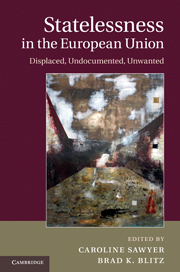Book contents
- Frontmatter
- Contents
- List of contributors
- List of cases
- List of conventions, covenants and treaties
- Acknowledgements
- List of abbreviations and acronyms
- PART I The issue
- 1 Statelessness in the European Union
- 2 Stateless people and undocumented migrants: an Arendtian perspective
- 3 The rights of non-citizens to membership
- 4 Stateless in Europe: legal aspects of de jure and de facto statelessness in the European Union
- 5 Policy responses and global discourses on the rights of non-citizens and stateless people
- PART II The research project
- 12 Conclusions
- Bibliography
- Index
- References
1 - Statelessness in the European Union
from PART I - The issue
Published online by Cambridge University Press: 17 February 2011
- Frontmatter
- Contents
- List of contributors
- List of cases
- List of conventions, covenants and treaties
- Acknowledgements
- List of abbreviations and acronyms
- PART I The issue
- 1 Statelessness in the European Union
- 2 Stateless people and undocumented migrants: an Arendtian perspective
- 3 The rights of non-citizens to membership
- 4 Stateless in Europe: legal aspects of de jure and de facto statelessness in the European Union
- 5 Policy responses and global discourses on the rights of non-citizens and stateless people
- PART II The research project
- 12 Conclusions
- Bibliography
- Index
- References
Summary
In June 2008 the Council of Europe's High Commissioner for Human Rights, Thomas Hammarberg, made the bold statement that ‘no one should be stateless in today's Europe’. His comments called attention to a problem which, although noted by the Council of Europe, has persisted in several European states, including both ‘old’ and ‘new’ members of the European Union. The solution is still elusive. Yet the problem of statelessness is not new – indeed the rights to nationality and the prohibition against the arbitrary deprivation of nationality were included in the 1948 Universal Declaration of Human Rights (UDHR). Over the past fifty years, both the Council of Europe and European Union have introduced enforceable human rights instruments, which are among the most far-reaching of the developed world, but they often offer little to Europe's stateless people. In practice, human rights do not cover everyone.
‘Statelessness’ in the legal sense describes people who are not nationals of any state. Although statelessness is decried in international law, and the UDHR proclaimed a right to a nationality, the United Nations High Commissioner for Refugees (UNHCR) estimated that there were over half a million stateless people in the European region, and perhaps 12 million stateless people worldwide.
Table 1.1 is based on data provided by UNHCR and provides an indication of the number of stateless people in the European region.
The figures in table 1.1 illustrate that the scale of statelessness is most pronounced in the Baltic states.
- Type
- Chapter
- Information
- Statelessness in the European UnionDisplaced, Undocumented, Unwanted, pp. 3 - 21Publisher: Cambridge University PressPrint publication year: 2011
References
- 3
- Cited by



